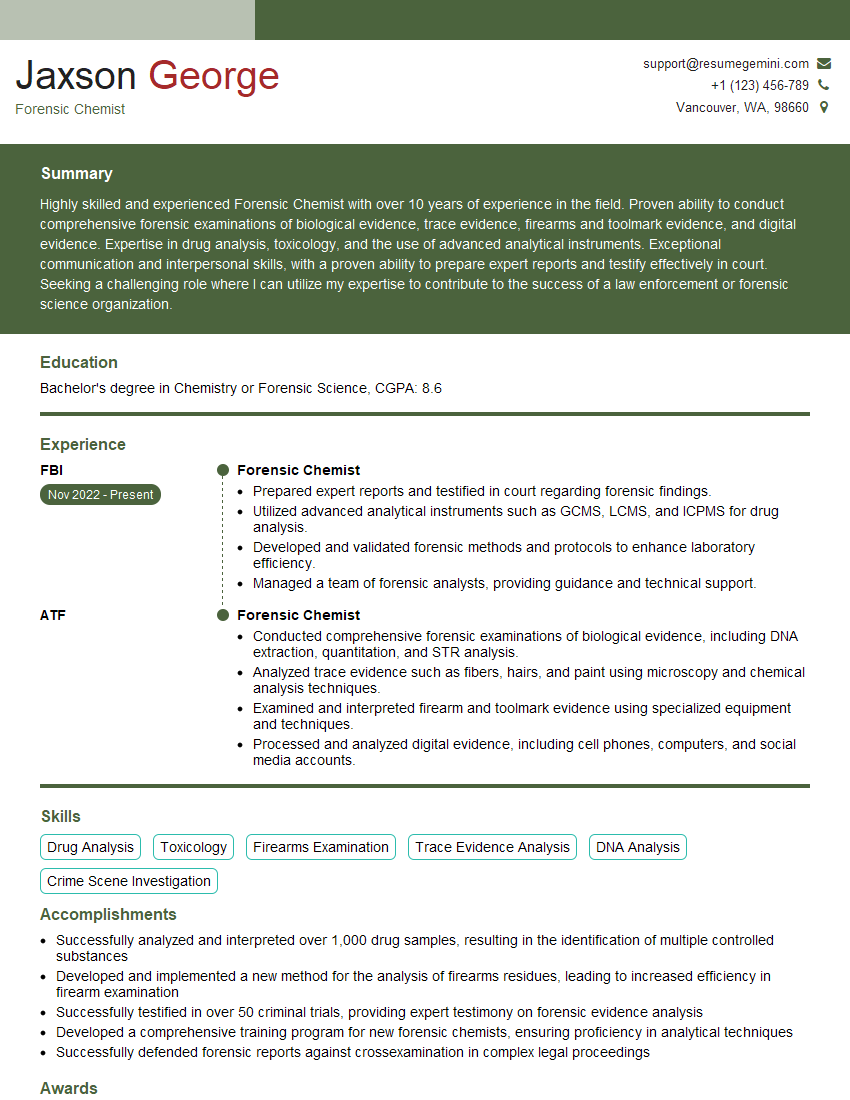Are you a seasoned Forensic Chemist seeking a new career path? Discover our professionally built Forensic Chemist Resume Template. This time-saving tool provides a solid foundation for your job search. Simply click “Edit Resume” to customize it with your unique experiences and achievements. Customize fonts and colors to match your personal style and increase your chances of landing your dream job. Explore more Resume Templates for additional options.

Jaxson George
Forensic Chemist
Summary
Highly skilled and experienced Forensic Chemist with over 10 years of experience in the field. Proven ability to conduct comprehensive forensic examinations of biological evidence, trace evidence, firearms and toolmark evidence, and digital evidence. Expertise in drug analysis, toxicology, and the use of advanced analytical instruments. Exceptional communication and interpersonal skills, with a proven ability to prepare expert reports and testify effectively in court. Seeking a challenging role where I can utilize my expertise to contribute to the success of a law enforcement or forensic science organization.
Education
Bachelor’s degree in Chemistry or Forensic Science
October 2018
Skills
- Drug Analysis
- Toxicology
- Firearms Examination
- Trace Evidence Analysis
- DNA Analysis
- Crime Scene Investigation
Work Experience
Forensic Chemist
- Prepared expert reports and testified in court regarding forensic findings.
- Utilized advanced analytical instruments such as GCMS, LCMS, and ICPMS for drug analysis.
- Developed and validated forensic methods and protocols to enhance laboratory efficiency.
- Managed a team of forensic analysts, providing guidance and technical support.
Forensic Chemist
- Conducted comprehensive forensic examinations of biological evidence, including DNA extraction, quantitation, and STR analysis.
- Analyzed trace evidence such as fibers, hairs, and paint using microscopy and chemical analysis techniques.
- Examined and interpreted firearm and toolmark evidence using specialized equipment and techniques.
- Processed and analyzed digital evidence, including cell phones, computers, and social media accounts.
Accomplishments
- Successfully analyzed and interpreted over 1,000 drug samples, resulting in the identification of multiple controlled substances
- Developed and implemented a new method for the analysis of firearms residues, leading to increased efficiency in firearm examination
- Successfully testified in over 50 criminal trials, providing expert testimony on forensic evidence analysis
- Developed a comprehensive training program for new forensic chemists, ensuring proficiency in analytical techniques
- Successfully defended forensic reports against crossexamination in complex legal proceedings
Awards
- Received the Forensic Chemist of the Year award from the American Academy of Forensic Sciences
- Won the Excellence in Forensic Toxicology award from the Society of Forensic Toxicologists
- Recognized by the National Institute of Justice for outstanding contributions to the field of forensic science
- Received the Distinguished Service Award from the International Association of Forensic Sciences
Certificates
- Certified Forensic Chemist (CFC)
- American Board of Criminalistics (ABC)
- International Association for Identification (IAI)
- National Forensic Science Technology Center (NFSTC)
Career Expert Tips:
- Select the ideal resume template to showcase your professional experience effectively.
- Master the art of resume writing to highlight your unique qualifications and achievements.
- Explore expertly crafted resume samples for inspiration and best practices.
- Build your best resume for free this new year with ResumeGemini. Enjoy exclusive discounts on ATS optimized resume templates.
How To Write Resume For Forensic Chemist
- Highlight your relevant skills and experience in your resume, including any specialized training or certifications.
- Quantify your accomplishments whenever possible, using specific numbers and metrics to demonstrate your impact.
- Tailor your resume to each job you apply for, highlighting the skills and experience that are most relevant to the position.
- Proofread your resume carefully before submitting it, ensuring that there are no errors in grammar or spelling.
Essential Experience Highlights for a Strong Forensic Chemist Resume
- Conducted comprehensive forensic examinations of biological evidence, including DNA extraction, quantitation, and STR analysis.
- Analyzed trace evidence such as fibers, hairs, and paint using microscopy and chemical analysis techniques.
- Examined and interpreted firearm and toolmark evidence using specialized equipment and techniques.
- Processed and analyzed digital evidence, including cell phones, computers, and social media accounts.
- Prepared expert reports and testified in court regarding forensic findings.
- Utilized advanced analytical instruments such as GCMS, LCMS, and ICPMS for drug analysis.
- Developed and validated forensic methods and protocols to enhance laboratory efficiency.
Frequently Asked Questions (FAQ’s) For Forensic Chemist
What is the role of a Forensic Chemist?
Forensic Chemists analyze evidence from crime scenes to help law enforcement and legal professionals solve crimes. They use their knowledge of chemistry to identify and analyze substances, such as drugs, explosives, and toxins, and to interpret the results of their analyses to provide expert testimony in court.
What are the educational requirements for becoming a Forensic Chemist?
Most Forensic Chemists have a bachelor’s degree in chemistry or forensic science, although some may have a degree in a related field, such as biology or physics. Some employers may also require a master’s degree or doctorate in a related field.
What are the key skills that a Forensic Chemist should possess?
Forensic Chemists need to have strong analytical skills, as well as a good understanding of chemistry and the ability to interpret complex data. They also need to be able to communicate their findings clearly and effectively, both in writing and in court.
What is the job outlook for Forensic Chemists?
The job outlook for forensic chemists is expected to be good over the next few years, as there is a growing demand for qualified forensic professionals. This demand is being driven by the increasing use of forensic evidence in criminal investigations and trials.
What are the salary expectations of a Forensic Chemist?
The salary expectations of a forensic chemist can vary depending on their experience, education, and location. According to the U.S. Bureau of Labor Statistics, the median annual salary for forensic science technicians was $62,850 as of May 2020.